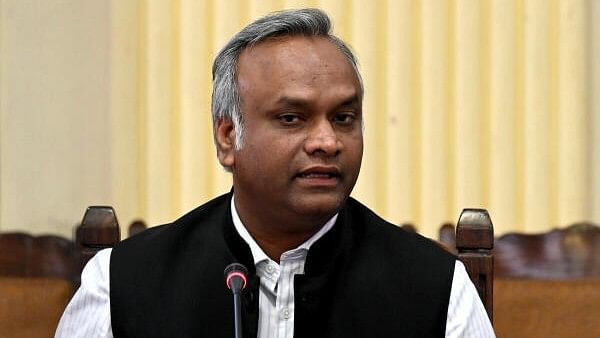
Karnataka Minister Priyank Kharge.
Credit: DH Photo
Bengaluru: Karnataka is aiming to occupy a third of India’s biotechnology space by having a market valued at $100 billion by 2030 through a new policy the government approved Thursday that promises “lucrative” incentives and subsidies.
According to the Karnataka Biotechnology Policy 2024-2029, which the Cabinet approved, the state has the potential to register a 19 per cent compound annual growth rate (CAGR) and reach $100 billion by 2030.
Without any stimulus, which the policy promises, Karnataka is projected to have a bioeconomy worth $70 billion.
If Karnataka meets its projections, it will hold a one-third share in India’s bioeconomy, which is projected to reach $300 billion from the current $151 billion at a 14 per cent CAGR.
Under the new policy, the government wants to establish at least 300 biotechnology companies, including 50 “particularly innovative or high-profile” firms.
“Karnataka is the leading state with more than 20 per cent share of the bioeconomy in India. In the comprehensive analysis of Karnataka’s bioeconomy, the biopharma sector emerges as the frontrunner...collectively amounting to $12.61 billion,” the policy states.
Biopharma is followed by the bioindustrial segment ($12.10 billion), bioservices ($5.09 billion) and bioagri ($1.22 billion).
“While these sectors collectively underscore the diverse and promising landscape of Karnataka’s bioeconomy, in an optimistic pursuit of $100 billion bioeconomy for 2030, government backing for key industries within a comprehensive framework is imperative,” the policy states.
The policy offers biotech startups -- outside Bengaluru with a maximum annual turnover of Rs 1 crore -- a 100 per cent reimbursement of annual GST. Similarly, startups outside Bengaluru will get a one-time capital grant of maximum 50 per cent or Rs 1 crore on fixed cost investments. Patent costs up to Rs 2 lakh (Indian) and Rs 10 lakh (international) will be reimbursed under the policy among other sops.
Micro, Small & Medium Enterprises (MSME) will get an interest subsidy of 6 per cent for loans up to Rs 50 lakh not exceeding eight years for new investments, 100 per cent reimbursement on land conversion fees among others.
Sops for large-scale biotech industries include a 10 per cent land cost subsidy, a one-time capital subsidy on sewage treatment plant cost, production-linked incentives and so on.
“With a growing bioeconomy, reaching a value from $27 billion to $31 billion in 2023, Karnataka spearheads the biotechnology industry with a total of 1,000+ startups and expenditure exceeding $200 million,” the policy points out.
